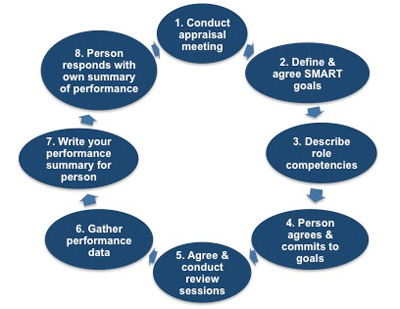Competency Development Process
One of your key responsibilities as a manager is to make certain that your team members develop the competencies needed to maximize their productivity and their value to the organization.
Identifying the competencies that an individual already has and those that they need to develop is a skill that is often neglected. In many instances managers never receive any formal training in this area and are often left to read a personnel manual or base their behavior on their own appraisal experiences. Understanding how to assess an individual's competencies from the behaviors they exhibit is a key management skill.
 |
Competencies are distinct from goals. Goals are concerned with 'what' has been accomplished; competencies are concerned with 'how' it was accomplished.
Both of these factors are equally important since it would be possible for someone to achieve all of his or her performance goals whilst creating problems with customers, suppliers, and co-workers. In fact, focusing exclusively on the achievement of performance goals with no reference as to how they have been achieved can prove disastrous in the long term.
For example, if a sales person has achieved all of their sales targets by misleading customers about product functionality or delivery dates then this would impact on other people in the organization and may damage the reputation of the organization itself.
Similarly, a technical support team member might have a good record of resolving technical problems, but if they appear condescending towards customers then this will need to be dealt with before it causes damage to the organization's image.
It can be tempting to focus your attention on goal attainment and disregard the behavioral aspects of performance, because goals are generally much easier to define and measure than competencies. However, you need to take account of both goals and competencies if you want to improve your team's performance in a way that benefits the whole organization.
You can use our Competency Observation Template to help you to keep high-level notes on each team member's progress in developing their competencies, and our Competency Evaluation Template will help you to record how and when an individual displayed the required competencies identified in their last appraisal.
In many organizations the appraisal cycle is used to assess future development needs as well as assess current performance. The appraisal cycle usually looks something like this:
 |
Both competencies and goals are equally important and focusing exclusively on the achievement of performance goals with no reference as to how they have been achieved is a shortsighted approach for the following reasons:
Firstly, because the way in which people achieve their goals has implications for the organization as a whole and ignoring this aspect of performance simply because it is difficult to measure can lead to serious problems.
Secondly, the work that you do to develop the competencies of your team members represents a direct investment in their future. Most people consider any increase in their skills and marketability as a positive thing and in the absence of a monitory reward (something you may not be able to offer) it can keep them motivated and engaged with their work. The time that you invest in developing your team can more than make up for the time you would spend dealing with motivation problems or resignation and recruitment issues.
Finally, your organization will only be successful in the long term if it can realize the potential of everyone who works there. Whilst it is true that there are costs incurred when developing people's competencies, it is still far cheaper to do so than to buy in the skills from outside, with all of the attendant uncertainty, risk, and management overhead that this involves.
You may also be interested in:
Competency Framework Example | Example Competency Framework | Measure Competencies | Knowledge, Skills and Attitudes | Developing Competencies at Work.



